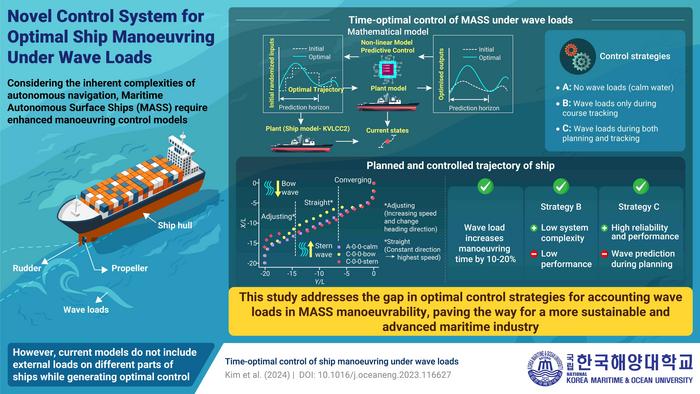The study of ship manoeuvring at sea has long been the central focus of the shipping industry. With the rapid advancements in remote control, communication technologies and artificial intelligence, the concept of Maritime Autonomous Surface Ships (MASS) has emerged as a promising solution for autonomous marine navigation. This shift highlights the growing need for optimal control models for autonomous ship manoeuvring.

Credit: Daejeong Kim from Korea Maritime & Ocean University
The study of ship manoeuvring at sea has long been the central focus of the shipping industry. With the rapid advancements in remote control, communication technologies and artificial intelligence, the concept of Maritime Autonomous Surface Ships (MASS) has emerged as a promising solution for autonomous marine navigation. This shift highlights the growing need for optimal control models for autonomous ship manoeuvring.
Designing a control system for time-efficient ship manoeuvring is one of the most difficult challenges in autonomous ship control. While many studies have investigated this problem and proposed various control methods, including Model Predictive Control (MPC), most have focused on control in calm waters, which do not represent real operating conditions. At sea, ships are continuously affected by different external loads, with loads from sea waves being the most significant factor affecting manoeuvring performance.
To address this gap, a team of researchers, led by Assistant Professor Daejeong Kim from the Division of Navigation Convergence Studies at the Korea Maritime & Ocean University in South Korea, designed a novel time-optimal control method for MASS. “Our control model accounts for various forces that act on the ship, enabling MASS to better navigate and track targets in dynamic sea conditions,” says Dr. Kim. Their study was made available online on January 05, 2024, and published in Volume 293 of the journal Ocean Engineering on February 01, 2024.
At the heart of this innovative control system is a comprehensive mathematical ship model that accounts for various forces in the sea, including wave loads, acting on key parts of a ship such as the hull, propellers, and rudders. However, this model cannot be directly used to optimise the manoeuvring time. For this, the researchers developed a novel time optimisation model that transforms the mathematical model from a temporal formulation to a spatial one. This successfully optimises the manoeuvring time.
These two models were integrated into a nonlinear MPC controller to achieve time-optimal control. They tested this controller by simulating a real ship model navigating in the sea with different wave loads. Additionally, for effective course planning and tracking researchers proposed three control strategies: Strategy A excluded wave loads during both the planning and tracking stages, serving as a reference; Strategy B included wave loads only in the planning stage, and Strategy C included wave loads in both stages, measuring their influence on both propulsion and steering.
Experiments revealed that wave loads increased the expected manoeuvring time on both strategies B and C. Comparing the two strategies, the researchers found strategy B to be simpler with lower performance than strategy C, with the latter being more reliable. However, strategy C places an additional burden on the controller by including wave load prediction in the planning stage.
“Our method enhances the efficiency and safety of autonomous vessel operations and potentially reduces shipping costs and carbon emissions, benefiting various sectors of the economy,” remarks Dr. Kim, highlighting the potential of this study. “Overall, our study addresses a critical gap in autonomous ship manoeuvring which could contribute to the development of a more technologically advanced maritime industry.”
***
Reference
Title of original paper: Time-optimal control of ship manoeuvring under wave loads
Journal: Ocean Engineering
DOI: https://doi.org/10.1016/j.oceaneng.2023.116627
About National Korea Maritime & Ocean University
South Korea’s most prestigious university for maritime studies, transportation science and engineering, the National Korea Maritime & Ocean University is located on an island in Busan. The university was established in 1945 and since then has merged with other universities to currently being the only post-secondary institution that specializes in maritime sciences and engineering. It has four colleges that offer both undergraduate and graduate courses.
To know more, visit: http://www.kmou.ac.kr/english/main.do
About the author
Daejeong Kim is currently an Assistant Professor in the Division of Navigation Convergence Studies at the National Korea Maritime & Ocean University. His research interests cover a wide spectrum, including conducting CFD simulations for ship manoeuvrability, motions, and resistance in waves. Additionally, he explores the performance of ship path-following and collision avoidance at sea. He has also actively contributed to various domestic R&D projects related to Maritime Autonomous Surface Ships (MASS).
Journal
Ocean Engineering
DOI
10.1016/j.oceaneng.2023.116627
Method of Research
Experimental study
Subject of Research
Not applicable
Article Title
Time-optimal control of ship manoeuvring under wave loads
Article Publication Date
5-Jan-2024
COI Statement
The authors declare the following financial interests/personal relationships which may be considered as potential competing interests:
Ming Zhang reports financial support was provided by National Natural
Science Foundation of China.




